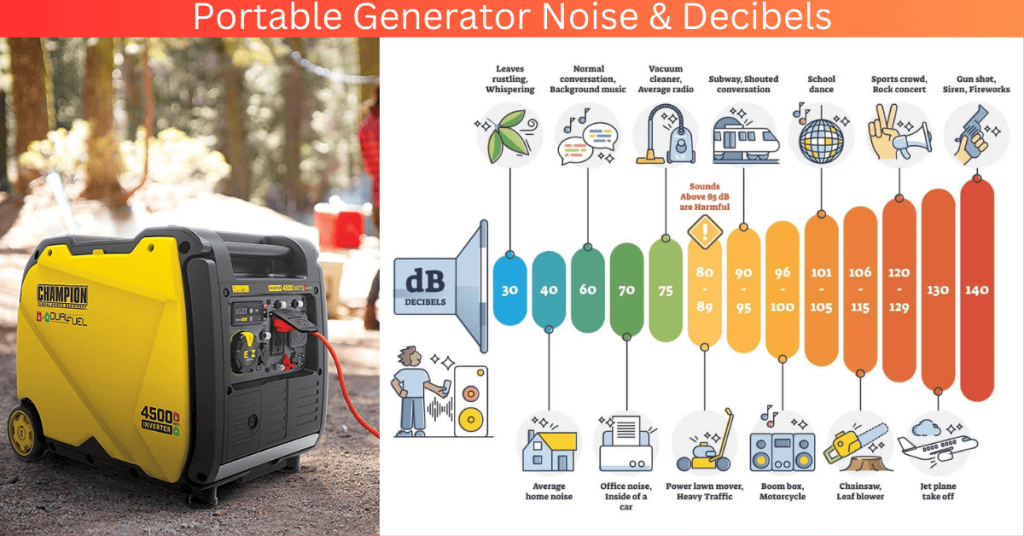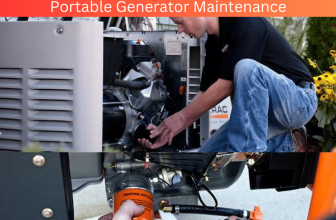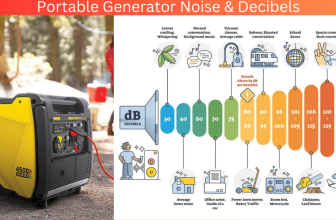Portable generators are a lifesaver during power outages, outdoor adventures, and for RVers on the go. However, generator noise can disrupt your peace and tranquility while you’re trying to enjoy these activities.
In this blog post, we’ll dive into the world of generator sounds and explore ways to navigate through the noise by understanding how it’s produced and measured. Moreover, we’ll provide practical tips on reducing portable generator noise for a harmonious experience.
Key Takeaways
- Portable generators produce noise due to the mechanical movement of their engines and exhaust systems, which create sound waves at varying decibel levels that can be measured using a sound meter.
- To reduce portable generator noise, consider investing in a quieter model, proper placement, and soundproofing options such as acoustical enclosures or generator boxes.
- Managing generator noise is important for personal comfort during power outages or outdoor adventures and adherence to environmental regulations. Excessive noise pollution can harm wildlife and disturb nearby residents while improper maintenance can lead to harmful emissions being released into the air.

Understanding Portable Generator Noise
Generators produce noise due to the mechanical movement of their engines and exhaust systems, which create sound waves at varying decibel levels that can be measured using a sound meter.
How Generators Produce Noise
As a proficient SEO and high-end copywriter, I understand that navigating the noise of portable generators can be quite the challenge.
Generators create sound through two primary sources: the engine itself and the exhaust system. The engine generates mechanical vibrations as it burns fuel to convert energy into electricity, while the cooling fan adds further noise by dissipating heat from internal components.
The second source of noise is found in the exhaust system with gases escaping under pressure at high speeds as part of normal operation. This rapid release produces loud sounds that are often enhanced by metal surfaces acting as unintentional amplifiers.
Understanding how generators produce noise is essential for finding solutions that work best in your specific situation – whether you’re camping with friends, providing power during emergencies or keeping your home running smoothly in times of need – so that you can continue enjoying life without missing out on vital comforts due to bothersome noises from your indispensable outdoor power equipment!
Decibel Levels And How They Are Measured
Understanding decibel levels and how they are measured is essential for anyone looking to reduce portable generator noise. Measured in units called decibels (dB), sound intensity levels give us an idea of just how loud or quiet something might be compared to the faintest audible sound.
To measure decibel levels, we use an instrument called a sound level meter – it picks up and measures the pressure changes in the air caused by sound waves. In relation to portable generators, knowing their noise output can help you determine which one is best suited for your needs and environment.
It’s important to keep regulations regarding standby generator noise in mind when choosing models too; some areas have local ordinances that may limit what kind of or how much outdoor power equipment you can use due to potential disturbance from high-decibel noises.
Tips For Reducing Portable Generator Noise
To reduce portable generator noise, consider investing in a quieter model, proper placement, and soundproofing options.
Choosing A Quieter Model
As a seasoned RVer or camper, you know the importance of having a reliable portable generator. However, the noise level can sometimes be unbearable and even disrupt your peaceful experience in nature.
To avoid this issue, it’s essential to invest in a quieter generator model.
One example is inverter generators which are known for being significantly quieter than traditional models. These advanced devices operate at lower decibel levels due to their ability to adjust engine speed based on power demand.
Keep an eye out for specifications like “whisper-quiet” or “low-noise” when browsing through different models, as those phrases often indicate that the manufacturer put effort into reducing noise output during operation.
Proper Generator Placement
One of the easiest ways to reduce generator noise is by placing it correctly. Here are some tips for proper generator placement:
- Put your generator on a flat and stable surface, free from any debris or obstacles.
- Keep it at least 10 – 15 feet away from the house or any other living space.
- Ensure there is enough ventilation around the unit to prevent overheating.
- Position the exhaust pipe in such a way that it points away from your home or campsite.
- Consider using a soundproofing box or enclosure around the generator to minimize noise transmission.
- Place your generator on carpeted flooring or soft ground to absorb some of its vibrations and noise.
- If you’re camping, place your generator near trees or bushes to help deflect and absorb some of the sound waves.
- Finally, always refer to the manufacturer’s instructions for specific placement guidelines, especially if you’re unsure about anything.
Properly placing your portable generator can make a significant difference in how much noise it produces. By following these tips, you can reduce sound pollution without compromising on power generation.
Soundproofing Options
Are you tired of the loud noise from your portable generator? Here are some soundproofing options that you can consider to reduce the noise level:
- Acoustical enclosures: These are the most common devices used to muffle generator noise. They consist of panels that reduce noise levels by absorbing, reflecting or diffusing sound waves.
- Sound deflectors: These devices redirect sound waves away from sensitive areas like homes and campsites. They work by using barriers to block and absorb sound energy.
- Water muffler: A water muffler is a device which can be fitted on the exhaust pipe of a generator. It uses water as a medium to muffle the noise produced by a generator.
- Soundproof generator box: There are many types of generator boxes available in the market that help reduce noise levels significantly. These boxes are designed to cover generators, providing an added layer of insulation for reducing noise levels.
- Generator exhaust silencer: These silencers are designed specifically for generators and go on the exhaust pipe of a generator to reduce noise levels.
- Shrubbery: Planting shrubs or other vegetation around the perimeter of your home or campsite can act as natural sound barriers, blocking and absorbing sound waves.
- Quiet generators: If you’re planning on purchasing a new portable generator, look for models with low decibel ratings (typically 60 decibels or less) that are specifically engineered for quiet operation.
By implementing these soundproofing options, you can enjoy reduced noise levels from your portable generators, making your camping trips more enjoyable and comfortable while minimizing environmental impact and compliance with local regulations.
Importance Of Managing Generator Noise
Managing generator noise is crucial for both personal comfort and environmental impact. Excessive noise pollution can disturb neighbors, wildlife, and cause hearing damage if sustained for prolonged periods.
Furthermore, generators that exceed local regulations on decibel levels may result in fines or legal consequences.
Personal Use And Comfort
As a homeowner or camper, you want to be comfortable while using your portable generator. That’s why managing the noise is so important. Loud generators can cause headaches and disturb your neighbors.
For personal use at home, consider placing the generator as far away from living areas as possible or building a soundproof enclosure around it. For camping trips, look for models specifically designed for quieter operation and check their decibel levels before purchasing.
By taking these steps, you can make sure that your portable generator doesn’t disrupt your comfort levels during power outages or outdoor adventures.
Environmental Impact And Regulations
As a conscientious generator user, it is important to understand the environmental impact and regulations surrounding portable generators. Excessive noise pollution can harm wildlife and disturb nearby residents.
Additionally, using a generator improperly or not maintaining it well can lead to harmful emissions being released into the air.
To avoid these negative impacts, make sure you choose an eco-friendly model when purchasing your portable generator. Consider options that use alternative fuels such as propane or natural gas rather than gasoline, which produces higher emissions.
By following these guidelines and being aware of environmental regulations in your area, you can reduce the impact of your portable generator on both people’s health and environment conservation efforts.
Conclusion
In conclusion, managing portable generator noise is important for personal comfort and environmental regulations. Understanding how generators produce noise and knowing the decibel levels can aid in selecting a quieter model.
Proper placement of the generator, sound deflectors, water mufflers, and soundproofing options can help reduce unwanted noise. Manufacturers have also developed silencers to lower decibels.
FAQs:
1. How loud are portable generators and how can I measure their sound output?
The loudness of a portable generator varies depending on its size, wattage capacity, and type. Most manufacturers provide the decibel (dB) rating as a measure of sound output which determines generator’s noise level. You should aim to choose a generator with low dB ratings if you need quiet operation.
2. Can I reduce the noise generated by my portable generator?
Yes, there are several measures that you can take to minimize your generator’s noise levels such as installing a muffler, choosing an enclosed or inverter-style generator, placing it on shock-absorbing materials and establishing further distance from surrounding buildings.
3. Are there any legal requirements for operating portable generators in residential areas?
Many municipalities require compliance with specific guidelines regarding use of outdoor power equipment including generators . This includes when they’re being used during certain times or locations where neighbors may be within earshot of the unit – therefore it’s important to familiarize yourself with local regulations prior to starting up your genset.
4. What safety precautions should I take when using my portable generator?
The primary hazard associated with portables is carbon monoxide poisoning resulting from inhaling exhaust fumes emitted by these engines if operated inside without proper ventilation or unventilated spaces near open windows/doors leading into enclosed spaces like garages/basements etc .
To avoid danger make sure your unit remains outside away openings around structure homes so harmful emissions do not seep indoors- this means keeping good circulation vents open makes all difference!




